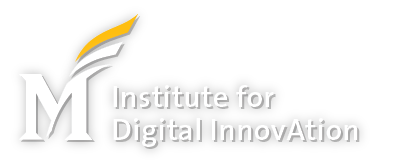IDIA Research Spotlight: Akila-Ka Ma’at 
Dr. Akila-Ka Ma’at (publishing as Jennifer R. Warren) holds joint positions in the Department of Communication, Women and Gender Studies, and the African and African American Studies program at George Mason University. Jennifer R. Warren is Dr. Ma’at’s given name and the one she publishes under.
Dr. Ma’at is an expert in social scientific and behavioral health research and qualitative research methodologies, health curricula development, community-based participatory engagement, digital health, multidisciplinary and translational research, and targeted evidence-based health message development/dissemination and community-engaged health work to motivate behavior change.
She has more than two decades of experience in conceptualizing, managing, and developing health programs, intervention strategy, and health program planning, development, execution, and evaluation as well as in multi-program supervision and management.
The IDIA spoke with Ma’at about the Black Interdisciplinary Research Translating and Transforming Health (BIRTTH) Lab and her research. Responses have been edited.
___________________________________________________________________
Tell us about your research.
At Mason, I have had the privilege of starting and directing a lab, the Black Interdisciplinary Research Translating and Transforming Health (BIRTTH) Lab. The BIRTTH Lab ultimately seeks the genesis of dynamic collaborative and innovative research that contributes to reducing disease among diverse Black women across the nation. Our central area is the effective communication of mental health, cardiovascular health, and reproductive health content to effect health behavior change that reduces morbidity and mortality among Black women. We are most concerned with intersections of multiple types of racism, racial stress, resilience, and health justice in our investigation of Black women’s health and the development of culturally targeted interventions. We use multiple methods in our studies. Centering Black women’s health is health justice work.
My line of ehealth research has focused on community engagement, identities (i.e., ethnic, class, relational, place-based), health behavior/knowledge, and digital health tool development and testing. I have engaged diverse Black American communities in a series of studies to evaluate the influence of personal, communal (i.e., ethnic/culture/class), and relational identities and enacted identity in digital tool use in tobacco cessation. This research demonstrates that Black and White individuals act out or perform their identities through health behavior, such as health information seeking. Black Americans are significantly predisposed to building and maintaining online relationships with others (i.e., relational identity) going through the same challenge. Ethnic, class-based, and place-based identities are salient for both Whites and Blacks. They are contributory factors in web efficacy, import of information, and confidence and motivation to seek, find, and utilize health information via a digital tool to quit smoking.
I am extending and integrating this formative research on digital health communication within the BIRTTH Lab. Questions that we are exploring are:
1) In what ways can clinical research, biospecimen collection, and biofeedback deepen our understanding of the relationships between diverse types of racism and racial stressors?
2) How can community-based participatory engagement facilitate the design and usability of an identity-congruent mobile intervention targeting Black women?
3) In what ways can content on intersectional racism, reducing racial stress, and building resilience increase relevance and use of the mHealth tool in mental, cardiovascular, and reproductive health?
4) How does integrating the mobile intervention within a health system impact feasibility of its use, relevance, and health service delivery for both providers and patients?
BIRTTH lab’s long-term goal is to test the efficacy of an mHealth tool that gives access to health information, cultivates behavior change in resisting the impact of intersectional racism, and provides a model for the design, development, and implementation that will be replicated to address diverse health topics. Our short-term goal is to develop an mHealth prototype and evaluate contributory, process, and outcome-related factors in CBPR studies.
What kinds of projects are funded?
Since coming to GMU, I have received a Faculty Research and Development Award (FRDA) to begin preliminary data collection on racism, racial stress, and resilience among perinatal Black women, which we’ll adapt and test among Black women with cardiovascular disease risks. We have applied for an Office of Research Innovation and Economic Impact (ORIEI) grant award that extends the FRDA research into the clinical setting with biospecimen collection. The BIRTTH Lab collaborates with INSPIRED Lab’s Director, Dr. Brittany Johnson-Matthews in Computer Science, to collect data from perinatal Black women regarding their perceptions about mHealth tools, functionality, and preferences on modality and content. Using our startup funds, this collaboration leads to the development of an mHealth prototype in perinatal health that we can then integrate into the next phase of this research – community-based participatory research (CBPR) in post-prototype development.
How do your projects impact other disciplines?
As an interdisciplinary researcher, my work draws upon and contributes to computer science, human development and family science, psychology, sociology, philosophy, public health, global and community health, health informatics, computational social science, biomedical science, women and gender studies, and African American studies.
In particular, in Philosophy, Dr. Rose Cherubin and I are engaged in a collaborative writing effort where I am addressing critical social science methodologies to extend philosophical conversations on critical relativism. The ORIEI grant proposal is a collaboration among the School of Nursing, Rehabilitation Science, Global and Community Health, INOVA, and the Southern New Jersey Perinatal Cooperative if funded. We are all interested in clinical research on perinatal health outcomes and racial stress, bringing our diverse disciplines together. It is my hope that these and other collaborations grow and productively continue through the development, testing, and implementation of an mHealth intervention.
I have two undergraduate students in Community Health and two who are transferring into the Masters of Public Health program working on research in the BIRTTH Lab. I have another undergraduate who is premed working in the lab. Ebtesam Al Haque, a Ph.D. student in Computer science, collaborates with the BIRTTH Lab. There are three Ph.D. students in Health Communication contributing as well. So, this research is drawing students from other disciplines together, a situation that I want to continue to foster.
What projects would you like to be reached out to for potential collaborations?
Our research in perinatal mHealth intervention development and dissemination needs collaborators. Additionally, the BIRTTH lab’s line of research in cardiovascular health requires collaborators for which we are looking to design an mHealth intervention targeting racial stressors and stress management.
We also have two systematic literature reviews in process – one addressing Alzheimer’s Disease among Black Americans, the other is on resilience and Black women, all leading to mHealth interventions. We are looking for students interested in learning systematic literature review methodology, health topics, or just want some research experience. I take time to train if needed.
What keywords describe your research?
Health Disparities, Health Inequities, Biomedical, Social Science, Behavioral Health, Black Women’s Health, Digital Tools, Intersectional Racism, Racial Stressors, Resilience, Interventions, Multidisciplinary, Mixed Methods, CBPR
How does your research help bring the Mason community together?
My research promotes equity and inclusion. And I always tell my students, “You can’t be brilliant by yourself.” This ethic and call for collaboration inspire me to break down the walls that would silo my research. These walls are passable to all interested in BIRTTH Lab research or who want to extend our research in relevant but new and exciting directions. My research calls for dynamic multidisciplinary collaboration, as it is demonstrating. These diverse collaborations and presenting our research to the Mason community will help bring the Mason community together.
BIRTTH Lab’s research is not only bringing the Mason community together. The goal is to bring together the local community with multidisciplinary scholars and students to work on research and community outreach to those most impacted by health inequities.
How can you be reached?
Please reach me at jwarre20@gmu.edu or 609-802-8476. My office is in Horizon Hall 5208. I am available in person and via Zoom.
Twitter: @dr_akilamaat
LinkedIn: Akila-Ka (Jennifer R. Warren) Ma’at, PhD

